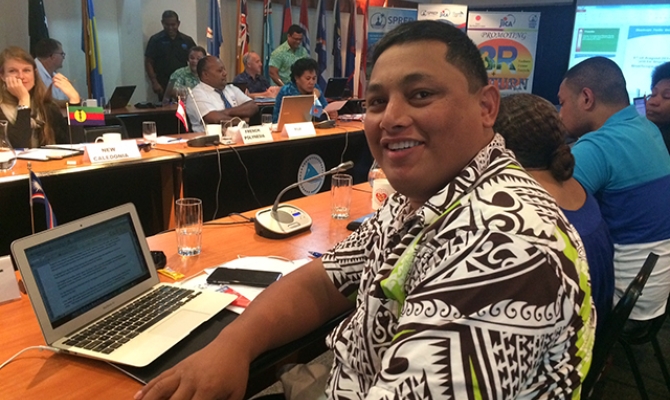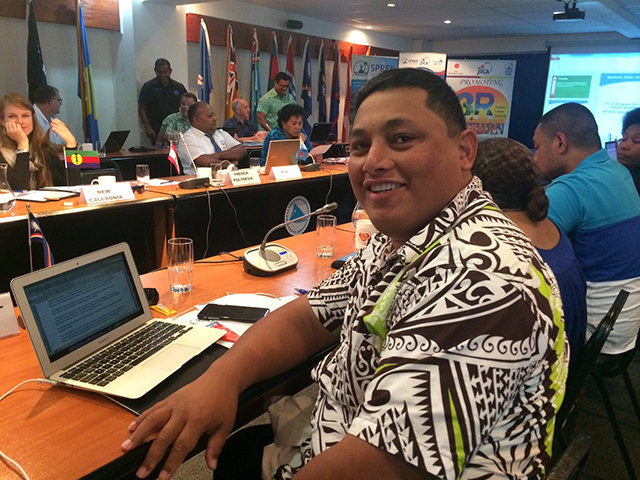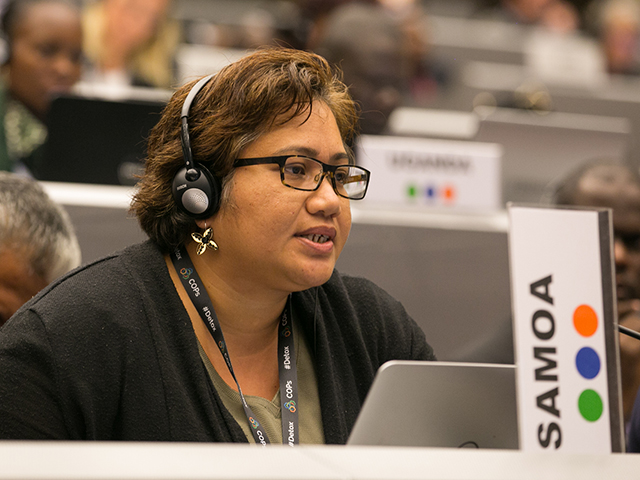
Waste Management and Pollution Control
Regional discussions on hazardous waste in the Pacific continue in Suva this week, with 16 Pacific island countries and territories meeting to discuss the Waigani Convention - the regional agreement that governs the trans-boundary movement of hazardous and radioactive waste in the Pacific.
A highlight from day three of the training from the Secretariat of the Pacific Regional Environment Programme (SPREP) was a session which featured presentations from all the Pacific island country and territory representatives at the meeting.
The Waigani Convention, which came into force in 2001, bans the importation of hazardous and radioactive wastes. Importantly, it also restricts the production of these waste types and encourages signatories to dispose of them in an environmentally sound manner.
For the Republic of the Marshall Islands, the legacy of radioactive waste is an issue that affects the country to this day.

From 1946-1958 the Republic of the Marshall Islands was subject to intense nuclear testing. During this period, 67 nuclear bombs were detonated in the area including a 15 megatonne 'bravo shot' bomb – 1000 times more powerful than the explosion that destroyed Hiroshima in 1945.
In 1977, the United States undertook a clean-up of radioactive waste in the nation which led to the collection of 111,000 cubic yards of contaminated soil and debris. This radioactive waste was housed in a 110 metre-wide structure - known as the Runit Dome - which, to this day, is located on Enewetak Atoll.
Mr Warwick Harris, Deputy Director of the Office of Environmental Planning and Policy Coordination, explains that it is the goal of the Government of the RMI to dispose of the Runit Dome:
"The proximity of the Runit Dome to the international borders of Kiribati and the Federated States of Micronesia, mean that this issue is not just a problem for the Republic of the Marshall Islands - it's a regional challenge."

Under the Waigani Convention - and other international agreements that govern and monitor radioactive waste - the circumstances leading to the creation of the Runit Dome could not take place happen today. Mr Clark Peteru, Legal Adviser at SPREP, explains:
"Through the Waigani Convention, the importation of radioactive waste is explicitly banned, and the exporting of radioactive waste is strictly controlled. This is a great example of how the convention helps to protect the Pacific environment and reduce risks to human health."
Representatives from all countries and territories presented stories at the meeting today. Dr Frank Griffin, Hazardous Waste Management Adviser at SPREP, has been impressed with the high level of engagement at the meeting to date:
"This meeting is proving to be a very effective vehicle through which we can hear directly from Pacific island countries and territories about the challenges that they face, at a national level, in enforcing and implementing the procedures related to this important Convention."
The mechanisms related to the enforcement of the Convention vary from island to island, but interestingly, the training has revealed that many island nations face similar challenges - especially with regard to coordination and reporting. Dr Griffin continues:
"The issue of data management is, for example, coming up very frequently as an area in which SPREP Members need our support. SPREP will be working closely with our Focal Points to find a way to address this very clear need - ideally through the provision of in-country training."
Discussions on the Waigani Convention are continuing until 23 July, 2015.
Attending the Waigani Convention Training are representatives from Cook Islands, Fiji, Federated States of Micronesia, Kiribati, Niue, Papua New Guinea, Samoa, Solomon Islands, Tonga, Tuvalu and Vanuatu who are Parties to the Convention. Also present are representatives from French Polynesia, Republic of the Marshall Islands, Nauru, New Caledonia, and Palau who are not Parties to the Convention, as well as representatives from PIFS.
The Waigani Convention Training is supported by the Pacific POPs Release Reduction project which is co-funded through the Global Environment Facility - Pacific Alliance for Sustainability (GEF-PAS) and Agence Française de Développement (AFD). It is executed by SPREP, in close cooperation with the United Nations Environment Programme (UNEP) and the Food and Agriculture Organization (FAO).
For more information please contact Dr Frank Griffin on [email protected]
A highlight from day three of the training from the Secretariat of the Pacific Regional Environment Programme (SPREP) was a session which featured presentations from all the Pacific island country and territory representatives at the meeting.
The Waigani Convention, which came into force in 2001, bans the importation of hazardous and radioactive wastes. Importantly, it also restricts the production of these waste types and encourages signatories to dispose of them in an environmentally sound manner.
For the Republic of the Marshall Islands, the legacy of radioactive waste is an issue that affects the country to this day.

Mr Warwick Harris, Deputy Director of the Office of Environmental Planning and Policy Coordination at the Waigani Convention Training in Suva, Fiji. Photo: A.Carvan/SPREP
From 1946-1958 the Republic of the Marshall Islands was subject to intense nuclear testing. During this period, 67 nuclear bombs were detonated in the area including a 15 megatonne 'bravo shot' bomb – 1000 times more powerful than the explosion that destroyed Hiroshima in 1945.
In 1977, the United States undertook a clean-up of radioactive waste in the nation which led to the collection of 111,000 cubic yards of contaminated soil and debris. This radioactive waste was housed in a 110 metre-wide structure - known as the Runit Dome - which, to this day, is located on Enewetak Atoll.
Mr Warwick Harris, Deputy Director of the Office of Environmental Planning and Policy Coordination, explains that it is the goal of the Government of the RMI to dispose of the Runit Dome:
"The proximity of the Runit Dome to the international borders of Kiribati and the Federated States of Micronesia, mean that this issue is not just a problem for the Republic of the Marshall Islands - it's a regional challenge."

The Runit Dome, located on Enewetak Atoll in the Republic of the Marshall Islands, houses radioactive waste. Photo: Public domain image via Wikimedia Commons
Under the Waigani Convention - and other international agreements that govern and monitor radioactive waste - the circumstances leading to the creation of the Runit Dome could not take place happen today. Mr Clark Peteru, Legal Adviser at SPREP, explains:
"Through the Waigani Convention, the importation of radioactive waste is explicitly banned, and the exporting of radioactive waste is strictly controlled. This is a great example of how the convention helps to protect the Pacific environment and reduce risks to human health."
Representatives from all countries and territories presented stories at the meeting today. Dr Frank Griffin, Hazardous Waste Management Adviser at SPREP, has been impressed with the high level of engagement at the meeting to date:
"This meeting is proving to be a very effective vehicle through which we can hear directly from Pacific island countries and territories about the challenges that they face, at a national level, in enforcing and implementing the procedures related to this important Convention."
The mechanisms related to the enforcement of the Convention vary from island to island, but interestingly, the training has revealed that many island nations face similar challenges - especially with regard to coordination and reporting. Dr Griffin continues:
"The issue of data management is, for example, coming up very frequently as an area in which SPREP Members need our support. SPREP will be working closely with our Focal Points to find a way to address this very clear need - ideally through the provision of in-country training."
Discussions on the Waigani Convention are continuing until 23 July, 2015.
Attending the Waigani Convention Training are representatives from Cook Islands, Fiji, Federated States of Micronesia, Kiribati, Niue, Papua New Guinea, Samoa, Solomon Islands, Tonga, Tuvalu and Vanuatu who are Parties to the Convention. Also present are representatives from French Polynesia, Republic of the Marshall Islands, Nauru, New Caledonia, and Palau who are not Parties to the Convention, as well as representatives from PIFS.
The Waigani Convention Training is supported by the Pacific POPs Release Reduction project which is co-funded through the Global Environment Facility - Pacific Alliance for Sustainability (GEF-PAS) and Agence Française de Développement (AFD). It is executed by SPREP, in close cooperation with the United Nations Environment Programme (UNEP) and the Food and Agriculture Organization (FAO).
For more information please contact Dr Frank Griffin on [email protected]